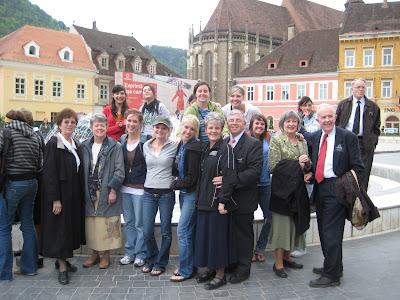We didn’t do as much touring around today, but we did go look around an old Greek Orthodox chapel. When we got there, a funeral that was being held there was just getting out, so we had to wait out on the street for a little bit. When we finally went inside, no one was there. I started walking around to look at all the beautiful paintings on the ceiling and an alter at the very front of the chapel. As I was looking, a priest came back in from outside and yelled at me. Apparently, only women are allowed in the back half of the chapel and are not allowed past a certain point. Then only the high priests are allowed in a little sacred room behind the alter. Luckily, none of us had made it that far yet.
After looking around, we browsed the souvenirs that the priest was selling at the very back of the chapel on a little table. I bought a little metal bracelet for 3 lei. As we were all paying for our things, an elderly man walked in the chapel and began talking with us and asking us where we were from. He didn’t seem to be completely all there, but was so adorable and friendly. All of a sudden, from behind the table, the priest grabbed his straw broom and smacked the old man really hard on the butt, almost knocking him down. I’m guessing he didn’t want a crazy man in his chapel. Luckily, the old man just started laughing, so we started laughing too. It’s not every day, you see a priest smack an old man with a broom.
Outside the chapel, the old man told us that we were all really beautiful and to be careful everywhere we go. One girl asked to take a picture with him, and pretty soon, the old man was posing for tons of pictures and making the funniest faces I have ever seen. For some reason, he kept opening his mouth really big, so we had to show him how to smile.

We told the old man goodbye then decided to go walk around in the cemetery right next to the chapel. We started walking that direction and the old man got really excited and motioned for us to follow him. He walked us through the cemetery and stopped at one particular grave. It had a few different names of members of his family on it. He set a candle he had alongside the grave. In the Orthodox Church, they believe that lighting a candle will carry your prayers up to heaven. He couldn’t light it, because he forgot a match and got frustrated and tears welled up in his eyes. We could tell this was really important to him. A couple girls ran back to see if there were any matches inside the chapel. The rest of us sat with the old man as he explained that his brother was buried there and had been killed by gunshot. As he was telling us, he put his head in his hands and began to sob. We didn’t really know what to do and there was little we knew how to say to him, but he seemed so lonely. I noticed there were flowers laid on many of the surrounding graves but that his brother’s was bare, so I picked a big, yellow dandelion and asked the man if I could lay it on the grave. He smiled really big and whispered ‘thank you’ through his tears.


The other girls came back with a lighter the priest had given them, and we helped the man light his candle. He cheered up a ton. We asked him if he wanted to pray, but he didn’t seem to understand, so we just sat with him a little while longer and listened as he told us more about his family. Again he started to sob. I will never forget the look in his eyes. They were filled with so much sorrow. We couldn’t really understand what he said had happened to his family, but we could tell the man had experienced a tragedy. He kept pointing to the grave over and over when he knew we didn’t understand and was trying so hard to tell us something. I wanted so bad just to be able to bear my testimony to this man and tell him that he would see his family again. We all just gave him hugs. It was all we could do. As I hugged him, I felt a lot of sympathy for him, and gained a small sense for what it is like to mourn with those that mourn.
We told the man goodbye and began to leave. I stayed a couple of steps behind the rest of the girls and shook his hand. Before I let go, I looked him in the eye and asked him in the little Romanian I could remember, “Do you know that Jesus Christ lives and that he loves us?” Tears streamed down his face as he smiled and nodded then thanked me over and over.
Later tonight, we played cards and went out for gogosi. As we were leaving the hostel, I discovered that my flipflops were missing. Everyone has to leave their shoes at the front door of the hostel. I was a little worried since they were the only pair of shoes I had brought to Brasov with me. I had to borrow someone’s bright pink crocks until I could look for mine, and when we went out on the streets, people were laughing and pointing at my feet. Later and literally only minutes before leaving to catch our train back to Iasi, I saw a girl walking around the hostel in my flip flops, and asked for them back. I wasn’t exactly willing to walk around the train station barefoot.












